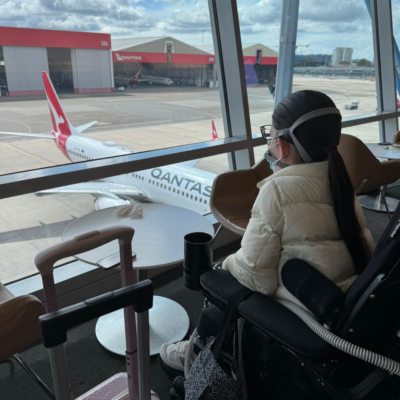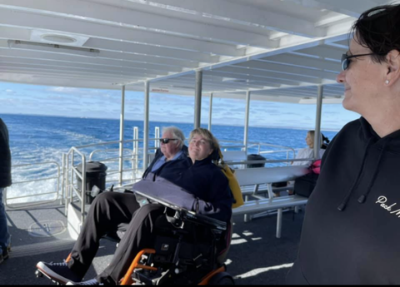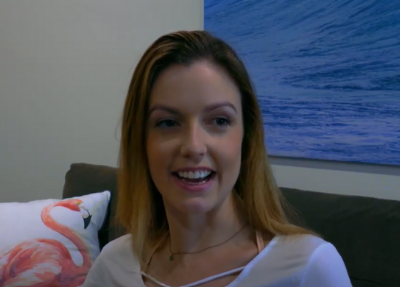Wheels In The Sky - Accessible International Travel
Looking to plan your next trip? Organisations like All Wheels Up and the Australian Government ‘The Aviation White Paper’ are making it easier for people with neuromuscular conditions to travel long distances/internationally. But what about when you get to the other side? We talked with our community to find out their tips and tricks for travelling internationally, as well as some funny stories along the way!
Travelling with a disability has once again made it into the news headlines with the struggles that people with disability have when it comes to airlines.
Organisations like All Wheels Up calling for airlines to be more accessible with the Australian Government also producing The Aviation White Paper which “sets out long-term policies and actions to guide the next generation of growth and innovation across Australian aviation”, which then would make it easier for people with neuromuscular conditions to travel long distances/internationally. But what about when you get to the other side?
We talked with our community to find out their tips and tricks for travelling internationally, as well as some funny stories along the way!
When travelling, what are your access needs?
Jack
I am unable to lift heavy objects from the ground, so when travelling, I often need assistance with lifting or managing heavy luggage such as a suitcase. If I’m carrying a backpack, I can only go up stairs when there are handrails available, as I rely on them for support and stability. Without railings, stairs become unsafe and inaccessible for me. Standing or walking for extended periods can cause my muscles to become tight and fatigued. When this happens, I am more prone to losing balance, falling, or sustaining injuries. Getting up from a seated position, whether from a chair or the ground, can be challenging and necessitates the use of both hands for support. Additionally, after sitting for long periods, my muscles can begin to ache due to a lack of movement.
Access Needs:
Regular rest breaks to sit and recover after standing or walking for long periods.
Avoidance of physically strenuous activities, such as extended stair use.
Transportation options that minimise long periods of standing or walking.
Assistance with lifting suitcases in settings like public transport or airports.
Reliable access to handrails when using stairs.
Accommodation on ground floor or lift accessible.
Tristram
I'm a powerchair user who is unable to self transfer. As a result, within accommodation, I need lots of space to manoeuvre my powerchair and my hoist for transfers, a fully accessible bathroom with no lips/steps for my shower chair, and split beds as I also travel with a support worker. Space and level surfaces are the best. In terms of general public access, I simply need flat entrances, lifts for multi-storeyed buildings, and accessible bathrooms!
How much planning did you do beforehand to ensure the trip was accessible as possible?
Jack
We planned ahead to make the trip as accessible as possible by ensuring we had suitable public transport options that minimised walking. For example, in Barcelona we used a hop-on, hop-off bus service and booked a hotel close to the main sites. For many attractions, we confirmed in advance whether they were accessible for people with disabilities, which made navigating them much easier.
However, there were areas where more planning would have been beneficial. Train travel was often challenging, as many trains had large steps to board and several stations lacked accessibility. Similarly, with air travel, we had assumed we would be able to walk directly onto planes, but many airlines required the use of extensive stairs, which created difficulties.
We were fortunate to have family and family friends join us for parts of the trip, which provided valuable support for both my mother and myself as we were travelling together.
Even with accommodation, we encountered unexpected issues. For instance, in Lourdes we booked an Airbnb that was advertised as ground-level, but it actually had 20–30 steps. This meant we had to find another hotel that was more accessible.
Tristram
I feel like I'm a pseudo travel agent whenever I'm preparing a trip! I have to call everywhere and ask for photos to give me the reassurance that a place is accessible. But the biggest challenge is dealing with airlines, getting my powerchair booked onto flights, and all the things I need to get from one place to another.
Which cities did you find the most accessible and why? What about the least accessible?
Jack
The city I found most accessible was Barcelona. The train station had many elevators, which made moving around much easier, and we were able to take a taxi directly from there. We relied on a hop-on, hop-off bus to visit most of the major sites, which reduced the amount of walking required. That said, Barcelona was still very hot, and many sites involved a lot of walking and uphill climbs, which made some parts challenging.
The least accessible place we visited was Lourdes, France. While it was a beautiful destination and I am glad I went, accessibility was difficult. The Airbnb we had booked had a significant number of steps despite being advertised as ground-level, and the town itself has many hills. Getting there also required taking a smaller airline that used stairs for boarding, which was not accessible. That said, Lourdes did have some positives. Many areas within the town had flat surfaces, which were easier to navigate once we found more suitable accommodation.
Tristram
Although much older, most European cities have worked wonders to ensure main tourist sites are accessible! I loved London (did you know all their standard cabs are accessible!?), Dublin, Paris, and Amsterdam. I carry a portable ramp on my powerchair when overseas, which I use to navigate steep curbs or small steps.
Besides from physical barriers, how did you find accessibility in terms of cost, language barriers or the attitudes of different countries towards people with disabilities?
Jack
In terms of cost, accessibility often came at an additional price. For example, we sometimes needed to use taxis instead of public transport, or book alternative accommodation when an Airbnb turned out not to be accessible. While these choices made travelling smoother, they also added extra expenses compared to what an able-bodied traveller might spend.
There were also many sites in Europe with numerous stairs, which meant I was not able to see everything. This limited access created situations where I missed parts of the experience that others could enjoy.
When it came to language barriers, I generally did not find this to be a significant challenge. In most places, people spoke English well enough to help with accessibility needs, which made communication easier.
As for attitudes, I was not significantly impacted by negative perceptions. In fact, Lourdes especially stood out as a place that showed great respect for people with health conditions, integrating those with disabilities into daily religious rituals and events in a way that felt inclusive and supportive.
Tristram
The biggest challenge with travel with a disability is the cost. We have to pay extra for more space - and the fact that I'm always travelling with a team of support workers. It adds up! But mostly, the attitudes of people within Europe are as good, if not better, than Australia.
What’s your funniest accessibility travel story
Jack
The funniest accessibility travel story was definitely in Lourdes. We arrived so excited, only to discover that our Airbnb, which was advertised as ground-level, actually had lots of stairs. After making multiple treks up and down, the final twist was that the place ended up flooding, and I had to sleep in a damp room all night!
In the end, it felt like we really worked (and sacrificed) to experience the spiritual sites of the Lady of Lourdes, but it gave us plenty to laugh about afterwards.
Tristram
I remember going to a restaurant in Amsterdam, and the wait staff saw I was struggling to lift my glass. He ran away and returned with a massive straw (at least two metres in length, curled up in a circle), unwound it, and asked me when to cut with a pair of scissors he was brandishing. I suddenly had a 40cm long straw to drink from my glass! It was such a simple, beautiful gesture.
If you could offer one piece of advice to someone traveling internationally for the first time, what would it be?
Jack
If I could offer one piece of advice to someone travelling internationally for the first time, it would be never to assume anything. You will often be surprised by unexpected barriers and will need to self-advocate along the way.
I learned that instead of “just sucking it up”, like I sometimes did by pushing myself to do long flights of stairs and ending up exhausted, it’s far better to accept help when it’s offered. Doing so allows you to save your energy and focus on enjoying the travel experience, rather than wearing yourself out.
Tristram
Travelling overseas can seem overwhelming, with loads of preparation, but never let that stop you. People will help you overcome barriers and give you the holiday you've always been craving!
Interested in reading more about travelling with a disability? Check out our blog article Travelling on a plane with a disability.
Have advice, 'how to' guides or a story you want to share? We want to hear from you!
You can submit your story or guide via our form. Provided your content meets our content requirements, your post will be published by a Loop moderator to the Living Life section.
Share your story



Join the conversation